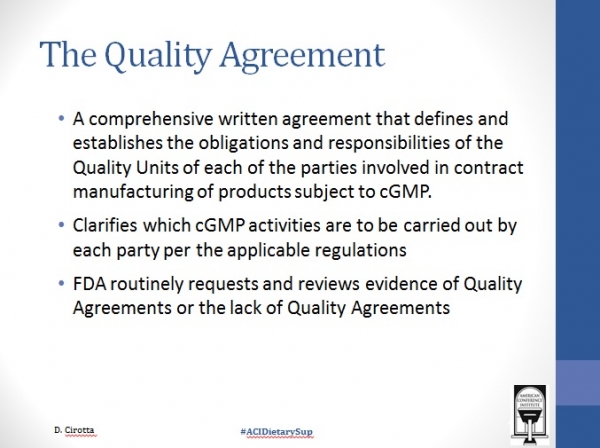‘Own label product distributors have to understand that ultimate responsibility lies with them’: Experts

The US Food and Drug Administration (FDA) has issued 38 warning letters to own label companies about cGMP violations since April 2013, said Justin Prochnow, a shareholder at Greenberg Traurig, LLP.
“Own label product distributors have to understand that ultimate responsibility still lies with them,” Prochnow told NutraIngredients-USA. “They can have different people perform different services, but at the end of the day, if their name is on the label, they are the ones that the FDA is going to hold responsible for making sure their products are manufactured in full compliance with the law.
“There has to be an understanding between the own label distributor and the contract manufacturer about the regulatory obligations and who is going to be responsible for what,” added Prochnow.
“The best way to ensure that is through a Quality Agreement that outlines duties, responsibilities, and repercussions for failures to uphold obligations.”
Quality Agreements
A Quality Agreement is a comprehensive written agreement that defines and establishes the obligations and responsibilities of the quality units of each of the parties involved in contract manufacturing of products subject to cGMP, explained Dean Cirotta, President and COO of EAS Consulting Group at the recent 3rd Annual Legal, Regulatory and Compliance Forum on Dietary Supplements (June 24-25, 2015 in New York) organized by the American Conference Institute in collaboration with the Council for Responsible Nutrition.
Cirotta told attendees that the agreement clarifies which cGMP activities are to be carried out by each party per the applicable regulations, and that the FDA routinely requests and reviews evidence of Quality Agreements or the lack of the agreements.
“The bigger issue is that quality agreements are still not widely enough used,” Cirotta told NutraIngredients-USA. “It’s about getting more companies to recognize the importance of them. It’s also about getting the contract manufacturers to acknowledge these are important. There are still some contract manufacturers that believe they don’t need to share this information.
“That number is going down, but we still get clients asking if their contract manufacturer should be keeping batch records from them, and the answer is most definitely no. You should have access to all of that information.”
Dean Cirotta’s key issues for a Quality Agreement
cGMP verification;
Communication and Confidentiality;
Roles & Responsibilities;
Signatories;
OLD’s right to audit;
Record Retention;
Storage & Shipping;
Personnel;
Label Management;
Specifications;
Supplier Qualification;
Raw Materials & Finished Product Testing;
Stability Testing;
Production & Packaging Records;
Sample Retention;
Deviations & the Unexpected;
Non-conforming Results (OOS);
Reprocessing/Disposals;
Change Controls;
Batch Record Review; Batch Release to OLD;
Final Product Release by OLD;
Use of 3rd Parties (Labs, etc.);
Complaint Handling;
Recalls, Market Withdrawals, Stock Recovery; and
Notice of FDA Inspections & Regulatory Activities










